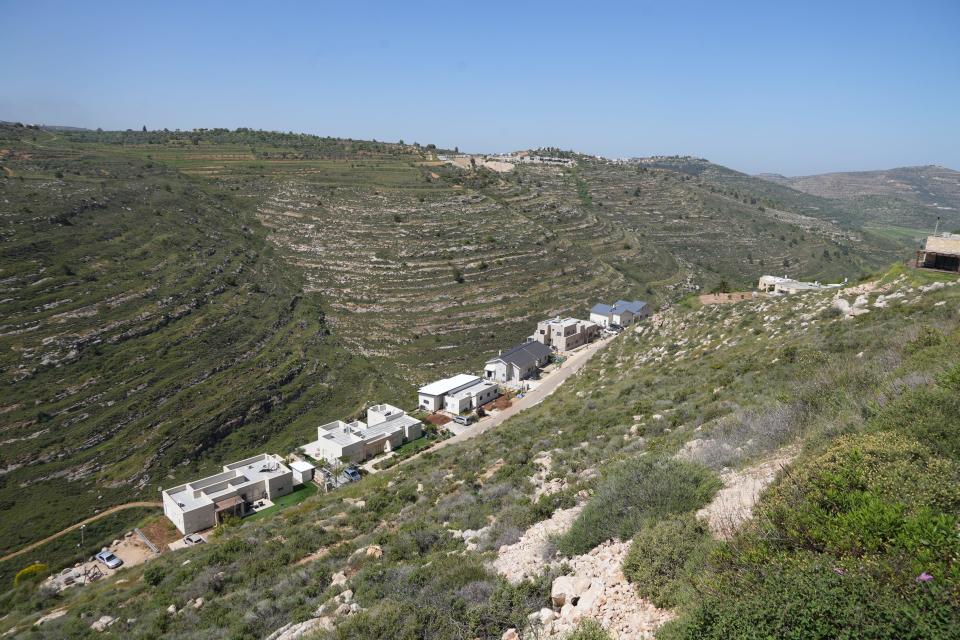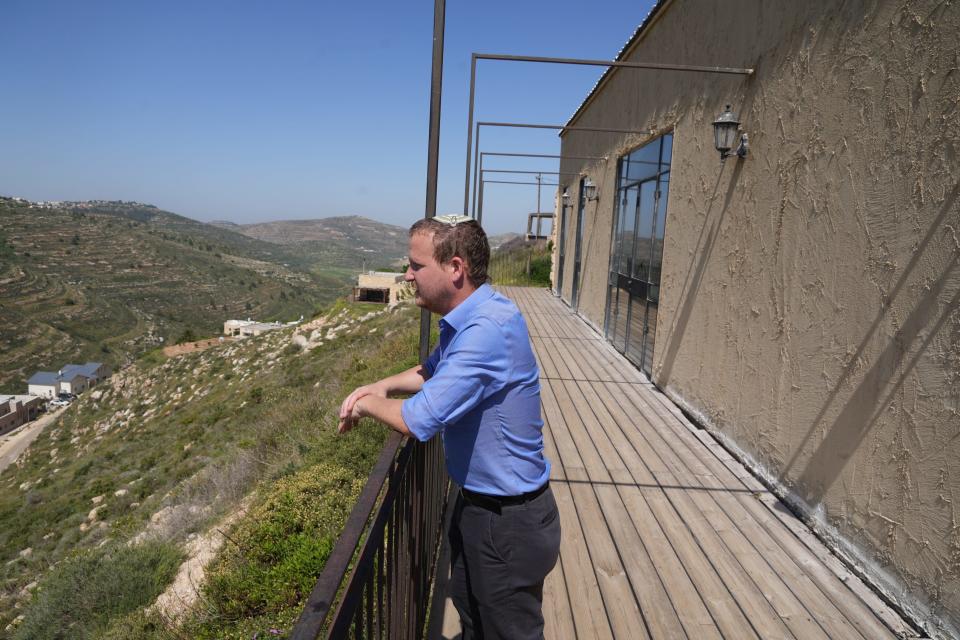On their nation's 75th anniversary, Israelis ask: Is this still a democracy?
GIVAT HAREL, West Bank – Lawyer Yotam Eyal is Orthodox, lives on land claimed by Palestinians and believes Israel needs to rigorously preserve its conservative Jewish values and identity. He supports attempts by the country's ultra-right-wing government to weaken its judiciary.
Tech executive Ronen Keler, from beachy, foodie, liberal Tel Aviv, is a secular Jew. He says that what is happening in Israel right now is about a populist government intent on engineering a "dictatorship." He opposes the reforms.
Makbula Nassar, an Arab Palestinian citizen of Israel and radio host from Nazareth, the north Israel city associated in the Bible with Jesus' hometown, says reforms or not, Israel is not the democracy it claims to be.
Israelis of all kinds have poured into the streets for months to protest the reforms. And the battle for where Israel goes as it marks its 75 anniversary this year – what kind of country it is or becomes – is far from over.
This week, Israel's Knesset, or Parliament, returned from its Passover holiday recess. Ahead of the monthlong break, Prime Minister Benjamin Netanyahu paused his efforts to get the reforms approved by lawmakers.
He wanted to lower the political temperature. He had good reason.
Since January, hundreds of thousands of Israelis on most Saturdays – the Jewish Sabbath – have angrily taken to the streets to protest the proposed overhaul. There have also been smaller pro-reform counterprotests, mostly in Jerusalem and Jewish settlements in the West Bank, a perennially volatile area partly administered by the Palestinian National Authority but effectively controlled by Israel's military. As many as 200,000 people, police said, gathered on the evening of April 27 outside the Knesset in support of the judicial overhaul.

The delay came amid spiraling walkouts by airport workers, unions, teachers, bankers, hi-tech workers, military reservists – the engine of Israel's middle class, the backbone of its security establishment, which relies on reservists. Israel's president, Isaac Herzog, warned of an impending societal collapse – perhaps even civil war. The White House, Israel's most committed ally, a country that figures heavily in its overall Middle East foreign policy, is Israel's largest supplier of military aid and is traditionally important to American Jews, urged Netanyahu to "walk away" from the overhaul. Leading American Jewish groups described what they were seeing in Israel as "painful" and implored Israel's political leaders to make concessions for the common good.
Ron DeSantis' stop in Israel: An appeal to religious voters, Jewish and evangelical
House Speaker Kevin McCarthy: Speaks to Knesset, the Israeli legislature, about 'special relationship'
"These reforms would give unchecked power to the government," says Rabbi Avidan Freedman, 42, who lives in Efrat, an Israeli community in the West Bank where most of the residents are Orthodox Jews. ''And that is something that's a really bad idea. And that's dangerous, regardless of your political position."
Shrugging off the 'fascist-adjacent' label
There are at least half a dozen specific proposals encapsulated in the reforms. However, at their core, all are about one thing: how much power the 15 unelected justices who sit on Israel's Supreme Court should be allowed to wield over the country's legislative and executive branches, according to Ami Pedahzur, a U.S.-based expert on Israeli politics and incoming professor at Israel's University of Haifa.
As it stands, the court can strike down cases it deems "unreasonable." To some, that is a slippery and vague concept. Proponents of the reforms say that standard favors the court's liberal, secular instincts.
"If you try to explain to someone how the system in Israel works, especially the justice system, they look at you like you're crazy," says Simcha Rothman, one of the most prominent of the reform's architects.

Rothman, a lawyer and member of the Knesset from the far-right Religious Zionist Party, is controversial. Israeli media has described him as leading a "constitutional coup" and "fascist-adjacent," claims he both shrugs off as ridiculous.
"If a terrorist kills someone, can you demolish his house? The law is very clear: yes. But it actually depends on the court's panel of judges. No one knows," Rothman says in an interview in his Knesset office. He delivers this example with an intense stare.
To emphasize his point, Rothman, who is 42 and known in Israel for his disputatious manner, especially with journalists, makes a show of wetting one of his fingers and pointing it upward into the air as if he's trying to test the direction of the judicial wind.
"No one knows," he reiterates.
A few days after the interview, Rothman was briefly trapped by protesters in a room where he was speaking at the World Zionist Congress, in Jerusalem. Video footage from the scene shows him being held in a locked room as demonstrators outside shout "shame" and "democracy" before he is rescued by Israeli police.

'I don't want Israel to become Iran'
Jonathan Rosenblum, 72, is a friend and ally of Rothman's and the founder of Jewish Media Resources, a Jerusalem-based organization that tries to help journalists in Israel better understand Orthodox communities. He describes Rothman as a "true genius."
He also says that what he is trying to do is misunderstood.
"I'm not interested in living in a theocracy,'' he says. ''I don't want Israel to become Iran. "The idea that anything that has any roots in Jewish law somehow turns Israel into a theocracy is misinterpretation."
Israel is one of the few countries in the world – the United Kingdom and New Zealand are two others – without a written constitution. Instead, it relies on a growing collection of laws, customs and precedents. Unlike the U.S. Congress, the Knesset is a unicameral legislature, meaning it has one lawmaking chamber. Checks on its power come from the government of the day and Israel's Supreme Court – the 15 unelected justices.
Supporters of the reforms like Rothman want not only to give the Knesset the power to override Supreme Court decisions with a simple majority vote. They also want to give the ruling government coalition a much more active role in appointing judges.
Opponents say minority rights, civil liberties and Israel's democracy itself are at stake. That is partly because the reforms are being championed by segments of Netanyahu's coalition government who are deeply religious, ultra-nationalist and have dated views on how Israeli society should be run and organized on everything from LGBTQ rights to whether leavened bread products should be allowed in hospitals during Passover.
A Supreme case: How a couple's wedding cake got caught up in Israeli judicial reform
"I believe in Judaism as something that is important to the identity of Israel," says tech executive Keler, 59, a reservist in Israel's navy – a commander who spent 25 years as a submarine captain. "But these reforms are being pushed by people in Netanyahu's coalition with bad intentions – right-wing extremists, the extreme Orthodox religious people. This isn't about left versus right, it's about extreme versus non-extreme."
Like many Israelis who have joined the protests against the reforms, Keler views his participation as nothing less than helping to safeguard Israel's political system. He also suspects that Netanyahu's interest in backing the reforms has little to do with the longest-tenured prime minister in Israel history's impartial constitutional interest in checks and balances.

And everything to do with Netanyahu's entanglement in a criminal trial on multiple corruption charges connected to accusations he granted political favors in return for luxury gifts and favorable news coverage.
Netanyahu strenuously denies the claim. However, his interest in weakening the powers of Israel's Supreme Court has grown in virtual lock-step with his personal legal woes. In fact, prior to announcing the parliamentary time-out on the reforms in late March, Netanyahu was able to get the Knesset to pass a law that takes power away from the attorney general to declare a leader unfit for office. This is the only proposed Netanyahu judicial reform that has actually become law. This would benefit someone, for example, convicted on corruption charges.
Still, as the Knesset gears this week up to once again debate the reforms, Israel's political leaders have claimed that negotiations aimed at some kind of compromise have been gathering momentum.
Yet for many Israelis, it's hard to imagine what compromise might look like. For them, their views on the reforms appear wholly inseparable from their beliefs about the ultimate character of a state formed 75 years ago this spring in the wake of the Holocaust, and as a refuge from the blight of worldwide antisemitism.
Israel may be a military, technological and economic powerhouse in the Middle East region. It is also a small country, with a population just under 10 million people, about 74% of whom identify as Jewish, according to Israel's Central Bureau of Statistics.
However, while Israel's Jews share many traditions and concerns, they are also highly divided. Among those who identify as Jewish, approximately 45% are secular, with the remainder observing different levels of religious strictness. But religious and secular Jews live entirely different lives and occupy vastly different social spheres. And their views contrast sharply on issues such as marriage, divorce, required military service and gender segregation. While secular Jews don't want religion anywhere near public policy, religious Jews strongly favor the idea that the government should promote religious beliefs and values.
Complicating matters, in a fractious debate about the proper role of religious values and beliefs in government, both sides feel their democratic rights are being trampled on.
Men and women separated at concerts
"The feeling among people like me is that even when 'our side' wins an election, our values and priorities are not represented because left-wing judges on the court, sometimes extreme left-wing ones, have these veto rights," says Ori Sobovitz, 43, an Orthodox Zionist who lives in Eli, a West Bank settlement.
"If religious people want to have their concerts separated for men and women, why can't they? This is what Jewish Halakha – Jewish law – says should happen. They are not talking about changing anyone else's life. They are not saying, 'Listen, Tel Aviv, we are demanding separate male and female concerts for everyone.' No, they are saying, 'For us, we want it separate.' The Supreme Courts says, 'No.' Why? Because it discriminates. This is about values. Who says your values are better than mine?"
But the frequency of the Israeli Supreme Court striking down laws is low. According to the Israel Democracy Institute, an independent research center, during the past 30 years Israel's Supreme Court has invalidated legislation in 22 cases – about 0.8 cases per year. The IDI has concluded that Israel's highest court does not strike down laws more frequently than other Supreme Courts worldwide. From 1995 to 2016, for example, the U.S. Supreme Court invalidated legislation about 2.3. times per year, according to the IDI's calculations.
However, on another metric – the number of petitions Israel's Supreme Court receives seeking to invalidate laws – its activity has risen sharply.
This could help explain why when lawyer Eyal talks about his fight for justice – why he believes the reforms are needed – he's concluded the state of Israel is not on his side.
"We feel that we have a judicial system against us," he says. He bemoans "activist judges" who jailed, for example, Israeli teenagers because they protested forced evacuations from Jewish settlements in the Gaza Strip, a self-governing Palestinian area that is ruled by Hamas, which the U.S. and other countries have designated a terrorist organization. He said the same standard was not being applied to current protesters.
Eyal, 34, is building a house for his young family in a fragrant valley surrounded by rocky terrain and majestic hills. On his West Bank settlement, Givat Hirel, there is an award-winning winery, a busy nursery, fancy homes with dramatic hilltop views and lush green gorges below – one of which is said to be one of the battle sites of the Maccabean Revolt, an ancient Jewish uprising against Greece's Seleucid Empire.
About 90 families live on Givat Hirel, which was founded in 1998 with encouragement from Ariel Sharon, Israel's then foreign minister. Sharon sought to entrench Israeli control over the area by inserting outposts that would disconnect Palestinian communities, which can be seen nestling in the hillsides surrounding Givat Hirel.

In February, Givat Hirel became of of nine settlements retroactively awarded full legal status by Netanyahu's government, with whom Israel's settlers have found common cause. In a prominent spot on the settlement, next to a large water tower emblazoned with Israel's flag – two blue stripes on a white background with a Star of David – there is a placard that marks the achievement. Scrawled on the sign, the signatures of about two dozen Israeli politicians. One of them is Rothman's.
Eyal is adamant that one of the reasons the reforms are necessary is because, in his view, even when Israel's government legalizes a settlement such as Givat Hirel, many of the rights that should be afforded him by that status tend to get struck down by the Supreme Court. Yuval Shany, an Israeli legal expert who did the IDI's calculations, says that it's not that the Supreme Court is striking down a lot of laws, it's that laws are not getting passed because lawmakers think the courts will strike them down. He says that the court tends to side with the government on issues related to West Bank settlers and Palestinians who bring claims of mistreatment before the court.
And he says he fears that without the reforms the country will lose aspects of its identity. In addition to those born to a Jewish mother or father, currently anyone with a Jewish grandparent or who has converted to Judaism is permitted to emigrate to Israel. Some of the reforms backer want to create a stricter definition of what kind of Jew can become a citizen.
As an air raid siren sounds across the hills – and across all of Israel – for Holocaust Remembrance Day, Eyal points out that the siren's wail is the best example yet why Jews need a state. He feels Israel's liberal traditions threaten this.
"I don't want to force everyone to be a religious person," he says. "What I am saying is that we need to look at the values religion gives us and make those part of the state."
'On the margins of Israel's democracy'
While explanations like Eyal's fail to convince Israel's secular Jews, they also don't mean much for the country's Arab citizens. Arab Israelis, who make up 20% of Israel's population – its largest minority group – have largely avoided the protests.
The five million Palestinians who live in Gaza and the West Bank have been even further removed from the protests that have roiled Israel since the start of the year – even as the protests in Israel have coincided with a spike in West Bank violence.
"Whether it's Netanyahu, his coalition or the opposition, they are all not much different when it comes to Palestinian rights, statehood or self-determination," says Mustafa Barghouti, a former Palestinian lawmaker and onetime presidential candidate.
"They don't want it."
And inside Israel, for decades, the government can seem unconcerned about the rights of its Palestinian citizens. Israel's Arabs disproportionately live in higher-crime, lower-income areas. Many struggle to find adequate housing.
The Knesset in 2019 passed a law that enshrined the right of national self-determination as "unique to the Jewish people," not all its nationals.
The move effectively downgraded the rights of Israel's Arab citizens, though they do have the right to vote and can serve in the military. Most choose not to.
"We live on the margins of Israel's democracy," says Muhammad Dahleh, a Jerusalem-based human rights lawyer who prefers to describe himself as a "Palestinian citizen of the state of Israel." Dahleh, 55, says it "gives me hope" when he sees Israel's Jews protesting the reforms but he says there are a number of factors that make it difficult for Israel's Arab citizens to participate in them, not least Israel's military, security services and police.
"They all, in a way, see Palestinians inside Israel as the enemy," he says.
"And actually I think the feeling is kind of mutual," he adds.
"Then, there is, of course, the Jewishness of all this – it's about the Jewish state, Jewish democracy, how religious or not Israel should be; plus, the presence of the Israeli flag is overwhelming. All this makes it very tricky for us as Palestinians living in Israel."
Nasser, 49, the radio host from Nazareth, is not discouraged.
She has two weekly shows during which she talks with people who call in to discuss different topics: Palestinian-Israel issues, discrimination, racism.
"I am not neutral," she says. "Sometimes we shout a lot."
She says she thinks of Israel as a "very sick democracy. It's a democracy for Jews; discrimination for Palestinians. Of course I can't deny, if I compare myself to someone in Egypt or Libya or Iraq, that Israel is more democratic. And I have more privileges than my people in the West Bank. But is this the comparison we want?"
Nasser says she understands why "white, mainstream Tel Aviv-y" and Arab Israeli protest leaders have, for the most part, taken a tactical decision to not encourage Israel's Arab citizens to join the protests, fearing their participation in large numbers could be seized upon by right-wing extremist groups for propaganda purposes and to justify – falsely – attacks by Jewish extremists on peaceful demonstrators.
But she says as the demonstrations have gone on, Jewish extremists have increasingly sought to make a closer connection between the protest's aims and Israel's Arab citizens, and this is a connection she finds both scary and inevitable.
"There will be a moment when we will join. It's not now but it's going to happen."
This article originally appeared on USA TODAY: Israel now in battle for future as Benjamin Netanyahu pushes reforms
